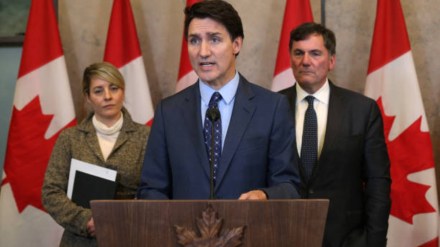The diplomatic rift between India and Canada deepened this week as India’s Ministry of External Affairs (MEA) condemned Canadian Prime Minister Justin Trudeau for failing to act against anti-India elements operating from Canadian soil. Despite repeated requests from New Delhi, the Canadian government has not taken significant steps to address India’s concerns about individuals promoting separatist ideologies, including members of the Lawrence Bishnoi gang, linked to violent criminal activities.
A Fractured Relationship
The current strain in diplomatic ties stems from the murder of Hardeep Singh Nijjar, a Khalistani separatist leader, in June 2023 near Vancouver. The Royal Canadian Mounted Police (RCMP) implicated Indian government agents in the assassination, prompting a sharp response from India. Trudeau’s claim that India had interfered with Canada’s sovereignty further escalated the situation, prompting tit-for-tat diplomatic expulsions.
During a public inquiry into foreign interference, Trudeau on Wednesday acknowledged that the allegations against India were based on intelligence rather than concrete evidence. This admission has only reinforced India’s position. “What we have heard today only confirms what we have been saying consistently all along—Canada has presented us no evidence whatsoever,” MEA official spokesperson Randhir Jaiswal stated in response to Trudeau’s testimony.
Jaiswal went on to call out the contradiction in Canada’s stance, accusing the country of harbouring individuals who pose a serious threat to India’s national security. “There is a gap between actions and words here,” Jaiswal said, highlighting that despite Trudeau’s claims of supporting India’s territorial integrity, no meaningful action has been taken against those advocating for the country’s disintegration.
Extradition Requests Left Unanswered
One of India’s long-standing grievances with Canada is its failure to act on 26 extradition requests that have been pending for over a decade. These requests include individuals accused of involvement in organized crime and terrorism, many of whom are connected to the Lawrence Bishnoi gang. According to India’s National Investigation Agency (NIA), the gang operates as a “terror-crime syndicate” with transnational reach, including a significant presence in Canada.
Jaiswal expressed frustration during the weekly media briefing: “We have shared security-related information with the Canadian government regarding gang members, including those of the Lawrence Bishnoi gang, and requested them to arrest or take action as per law. So far, no action has been taken, which is very serious.”
India has shared a list. Who is on the list?
Among those India seeks to extradite are Gurjit Singh, Gurjinder Singh, Arshdeep Singh Gill, Lakhbir Singh Landa, and Gurpreet Singh, all of whom are believed to be key operatives in the Bishnoi gang. These individuals are not only involved in criminal activities but are also linked to anti-India movements, making their presence in Canada a critical concern for New Delhi.
India has repeatedly stressed that Canada’s inaction on these extradition requests enables these criminal elements to operate with impunity. “It is strange that while Canada accuses India of interference, it has failed to address our legitimate concerns about the activities of these individuals,” the spokesperson added.
The Nijjar Case: A Turning Point
The murder of Hardeep Singh Nijjar, a designated terrorist by India’s NIA, has become the focal point of the diplomatic dispute. Trudeau’s accusation that Indian agents were involved in the killing was met with swift denials from New Delhi, which called the claims “absurd” and “politically motivated.” The Indian government has maintained that it had no role in Nijjar’s death and has called on Canada to provide evidence to back up its claims.
“We have consistently asked Canada to present any evidence it may have, but none has been shared with us,” Jaiswal reiterated during the briefing. India’s stance remains firm—without hard evidence, the accusations are baseless.
Trudeau’s Assertion
Despite Trudeau’s public assertion that India had made a “horrific mistake” by allegedly interfering in Canadian affairs, his testimony before the public inquiry revealed that the Canadian government lacked substantive proof. “It was primarily intelligence, not hard evidentiary proof,” Trudeau admitted, adding that Canada had hoped to collaborate with India on the investigation. However, this cooperation has not materialized, further straining the relationship between the two countries.
Diplomatic Fallout
The diplomatic standoff reached a new low this week when both countries expelled six diplomats from each other’s missions. Canada also designated India’s High Commissioner and other senior diplomats as “persons of interest” in the investigation into Nijjar’s murder. In response, India recalled its High Commissioner and five other diplomats from Ottawa, accusing Canada of failing to ensure their safety.
MEA has been clear in its assessment of the situation. “We had no faith that the Canadian government would look after the safety of our diplomats,” Jaiswal said, explaining the decision to withdraw the diplomats before Canada formally requested their departure.
The expulsion of diplomats and the breakdown of communication highlight the severity of the crisis. India has urged Canada to take responsibility for the damage caused to the bilateral relationship. “The responsibility for this lies squarely with Prime Minister Trudeau,” Jaiswal stressed.
A Path Forward?
As the diplomatic rift shows no sign of easing, the MEA has reiterated its demand for Canada to act on the pending extradition requests and to curb the activities of anti-India elements. The inaction, according to Indian officials, is not only damaging bilateral relations but also poses a direct threat to India’s national security.
While Trudeau has spoken publicly about his commitment to addressing foreign interference, India remains skeptical. “There is a gap between action and words,” Jaiswal said, underscoring the growing frustration in New Delhi.
The Indian government has made it clear that until Canada takes decisive steps to address its concerns, the relationship between the two countries will remain strained. The ball, as far as India is concerned, is now in Canada’s court.
